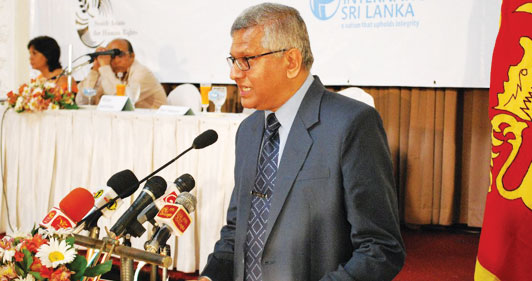Most countries have robust systems that examine the functioning of the legislator based on which improvements are made. This diagnosis is an inevitable requirement if people are to benefit consistently from this powerful and influential institution TISL Executive Director, Dr Wijaya Jayatilaka said
He said this while welcoming a representative gathering including Ministers, Members of Parliament, academics, activists and media at the national forum organised by TISL and South Asians for Human Rights (SAHR) held on Thursday, 16 February at the Galle Face Hotel.
“No parliament in the world is perfect. Perfection is an ideal we all strive to. The Parliament, including its elected representatives, the administration, the citizens and other stakeholders, we hope will reflect on the findings and identify methods of improvements and commit to change management in a meaningful way” he added.
Following is the full text of his speech.
When looking at the image of our Parliament I must say from Gordon Gardens to Galle Face, then to Sri Jayawardenepura, the legislature has moved geographically. Further, the legislature has changed in name, stature and influence. Making its appearance in the political landscape of the country as the Legislative Council in 1833 (-1931), the State Council 1931 (- 1947), the House of Representatives 1947 (- 1972), the National State Assembly in 1972 (- 1978) and finally as the Parliament in 1978, the institution has changed.
The parliament has been entrusted with the noble task of law- making, in the best interest of the people. Enacting laws to ensure equality, inclusion, and justice, is its core business.
From 101 MPs in engaged in its business in 1947, today we have 225 MPs. Since establishing a constitutional form of governance in the country we have had 23 governments under ten heads of state. The legislature had 21 speakers. People elect their representatives to parliament, from among whom a group forms the government to manage affairs of the state. The parliament legislates processes to ensure that people’s rights and needs are met. The 1978 constitution defines the responsibilities of parliament in articles 4(a), 75, 76 and 152.
The inter-parliamentary union, undertaking two case studies in Zambia and Tanzania in 2009 made several recommendations on how to improve the functioning of these parliaments. This came out of an analysis of all aspects of how the legislators were functioning.
Most countries have robust systems that examine the functioning of the legislator based on which improvements are made. This diagnosis is an inevitable requirement if people are to benefit consistently from this powerful and influential institution. It is within the ideals of democracy that the legislator is examined.
It is through review and analysis that we are able to identify areas for up-scaling or improvements for change.
TISL as a leader in Anti-corruption research and advocacy work, published the National Integrity System Assessment (NIA) for 2010. One chapter has focussed on the Parliament. The findings and recommendations are shared in a report which is available on line in our website. The parliament Watch project adds to this knowledge base.
The Parliament Watch project launched in South Asia is a similar effort. Transparency International supported by South Asians for Human Rights (SAHAR) has reviewed the functioning of the Sri Lanka parliament for 2011 and we are gathered here to learn about the findings,…. to appreciate what is positive and to identify methods of how best to improve and strengthen the Parliament. On behalf of SAHAR and TISL, a warm welcome to all and best wishes to a successful completion of the program.

